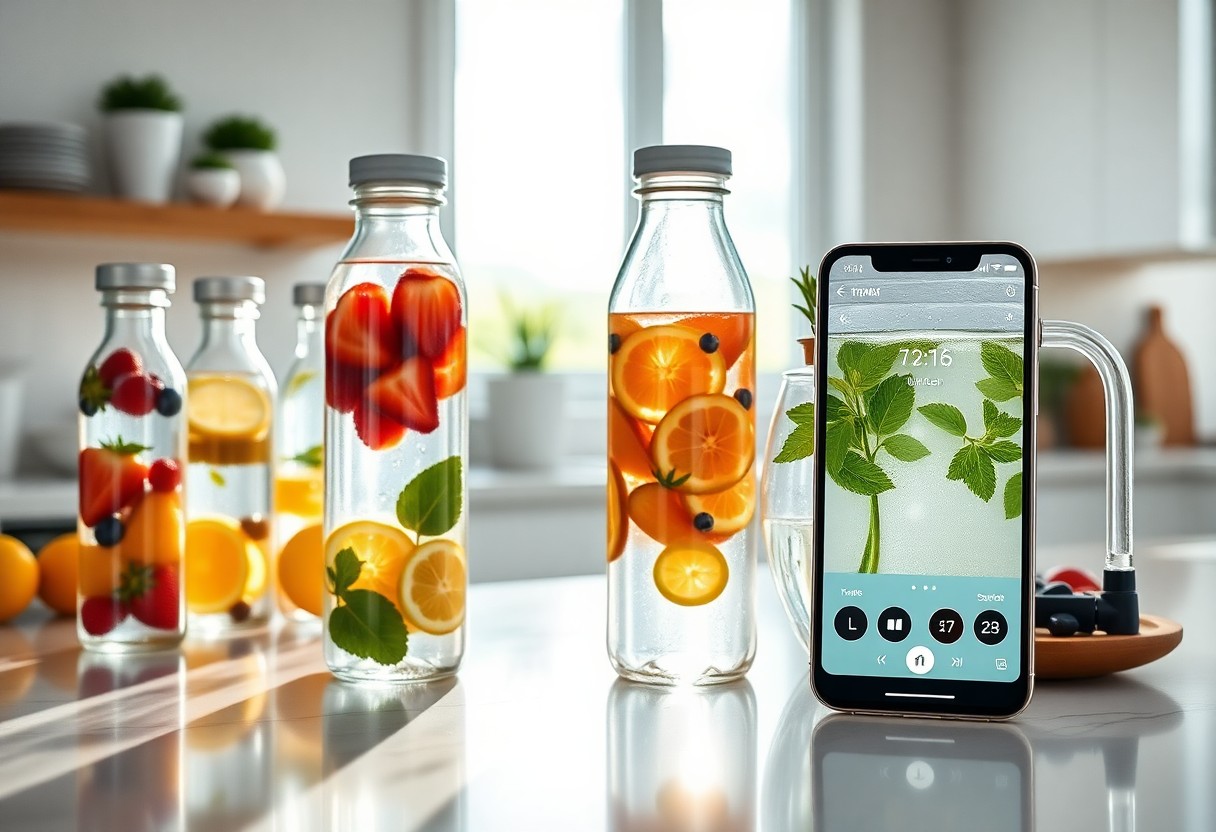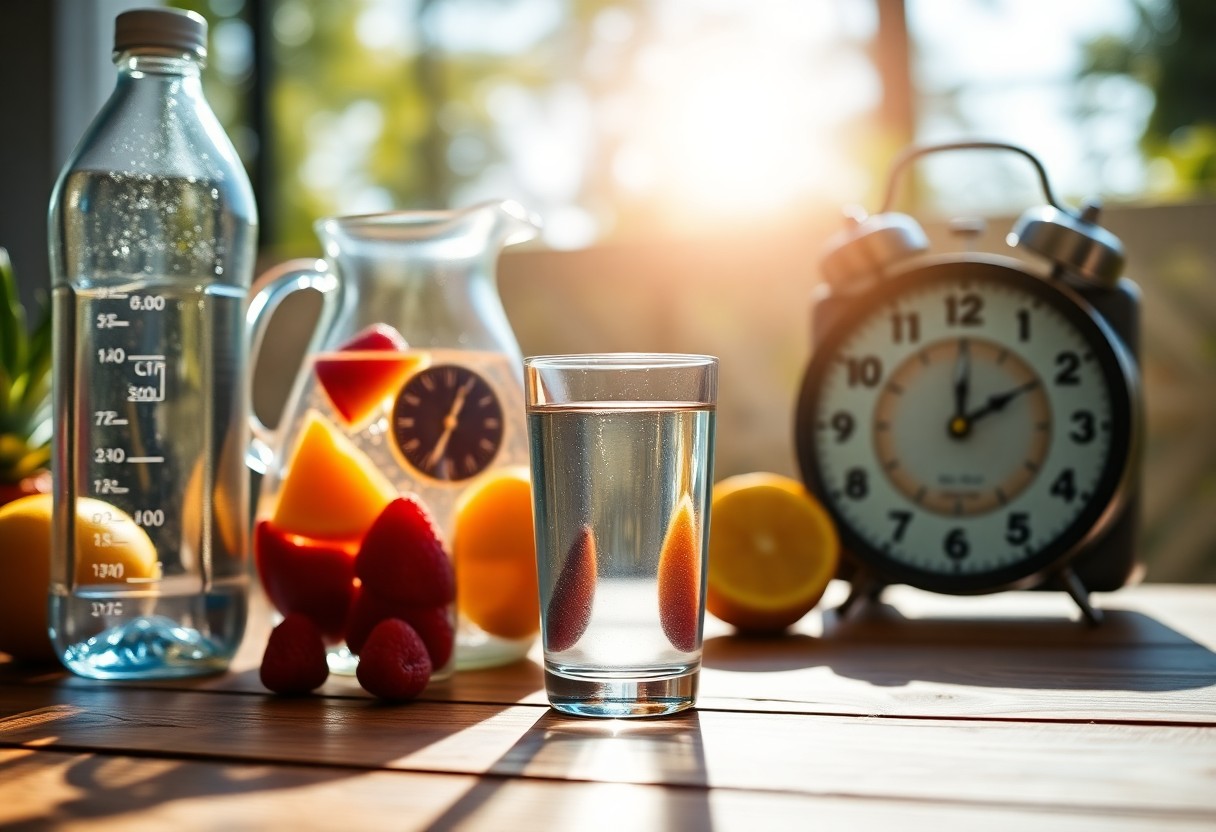With the rising temperatures and physical activities, it’s crucial that you prioritize hydration to prevent dehydration. Dehydration can lead to serious health issues, including fatigue, dizziness, and heat-related illnesses. You should aim to drink water regularly throughout the day, especially when exercising or in hot weather. Staying adequately hydrated not only boosts your energy levels but also enhances your overall well-being. Make it a habit to have water easily accessible, so you can take sips throughout the day and keep your body functioning optimally.
Key Takeaways:
- Dehydration can lead to serious health issues, making it crucial to drink water regularly throughout the day.
- Recognizing early signs of dehydration, such as thirst and dry mouth, can help prevent more severe symptoms.
- Increased physical activity or hot weather elevates the need for fluid intake, highlighting the importance of hydration in various conditions.
The Body’s Cry for Water: Signs of Dehydration
Dehydration manifests in various ways, and it’s important to tune into your body’s signals. You might find yourself experiencing a *dry mouth*, fatigue, or a sudden drop in energy levels. If you notice a darker shade to your urine or infrequent bathroom trips, these could also be clear indicators that your body is lacking the hydration it needs to operate optimally. Taking these signs seriously and responding promptly can help you avoid more severe complications associated with dehydration.
Physical Symptoms to Watch
Pay attention to *headaches*, dizziness, or muscle cramps as these can be direct manifestations of dehydration. You might also feel thirsty more often, or your skin may lose its elasticity. A common measure is the frequency of urination; if it occurs less than five to six times a day, your body is likely signaling that it’s dehydrated, thus requiring immediate attention to your hydration status.
Mental and Emotional Indicators
Your mental state can also reveal whether you’re dehydrated. You may find yourself feeling irritable, unable to concentrate, or more anxious than usual. Along with diminished cognitive function, dehydration affects mood stability and can lead to increased feelings of fatigue and stress.
Increased *irritability* and *anxiety* can arise when you’re not adequately hydrated. Research indicates that even mild dehydration can affect mood and cognitive performance, leading to diminished alertness and increased feelings of anxiety. A study published in the *Journal of Nutrition* revealed that participants who were mildly dehydrated scored lower on tasks requiring attention and memory. This means staying well-hydrated is imperative not just for physical performance, but also for maintaining *mental clarity* and emotional balance throughout your day.
The Right Amount of Hydration: How Much Water Do We Really Need?
The amount of water you need daily varies significantly based on numerous factors, including your health, lifestyle, and environment. On average, the recommended water intake is about 3.7 liters for men and 2.7 liters for women, encompassing all sources of moisture, like food and beverages. Staying attuned to your body’s signals will help you gauge whether you’re hydrated or need to up your fluid intake.
Factors Influencing Hydration Needs
Your hydration requirements are influenced by various factors, including activity level, climate, and individual health status. Pay attention to these:
- Activity level – Higher physical exertion, like sports, demands more water.
- Climate – Hot or humid environments necessitate increased hydration.
- Age – Infants and seniors may have different hydration needs.
- Health conditions – Certain illnesses or medications can affect hydration levels.
Thou must consider these elements to fine-tune your personal hydration strategy.
The Role of Age, Activity Level, and Environment
Your age, the level of your daily activities, and the environment you live in play significant roles in determining your hydration needs. As you age, your body may become less efficient at signaling thirst, resulting in a higher risk of dehydration. During physical activities, especially in warm climates, you lose fluid through sweat and must replenish it accordingly. Additionally, during intense heat or high altitude, your body requires even more hydration than usual to function optimally.
For instance, children and seniors often need tailored hydration plans due to their unique physiological characteristics. Young athletes, with their vigorous training, should consume water before, during, and after exercises to ensure their performance isn’t compromised. In warmer months, it’s advisable to increase your fluid intake, as your body loses more water through perspiration. Assessing your daily activities and environmental conditions will help you adjust your hydration goals effectively.
Beyond Water: Exploring Hydration Sources
While water is the most effective way to stay hydrated, you can also explore a variety of other sources to meet your hydration needs. These include beverages such as herbal teas and coconut water, as well as foods that are high in water content. Incorporating these options into your daily routine can enhance your overall fluid intake and support your health in multiple ways. Understanding these hydration sources will allow you to optimize your fluid consumption throughout the day.
Hydrating Foods that Can Help
Certain foods can significantly contribute to your hydration, with fruits and vegetables leading the way. For instance, watermelon and cucumbers contain over 90% water, making them excellent snacks for replenishing fluids. Other options, like oranges and strawberries, not only provide hydration but also come packed with vitamins and antioxidants. Including these hydrating foods in your meals can bolster your hydration levels and enhance your overall diet.
The Impact of Caffeinated and Sugary Drinks
Caffeinated beverages and sugary drinks may seem refreshing but can actually have a dehydrating effect. Caffeine, found in coffee and energy drinks, acts as a diuretic, potentially leading to increased fluid loss. In contrast, sugary drinks often contain high amounts of sugar, which can contribute to an imbalance in your body’s hydration levels. While they can quench your thirst temporarily, they may leave you feeling more dehydrated in the long run.
Research suggests that caffeine can cause an increase in urine production, particularly when consumed in higher amounts—about 300 mg or more per day, equivalent to roughly three cups of coffee. Additionally, sugary beverages can lead to a quick spike in blood sugar, followed by a crash that may make you feel thirsty again soon after consuming them. Relying on these drinks instead of water can send mixed signals to your body’s hydration needs, making it crucial to prioritize fluids that truly nourish and hydrate.

Implementing Hydration Strategies: Tips for Daily Water Intake
Consistently enhancing your daily water intake can be straightforward with a few simple strategies. Consider the following tips to elevate your hydration game:
- Carry a reusable water bottle to track your consumption.
- Set reminders on your phone to prompt regular sips.
- Link water intake with your daily activities, such as drinking a glass before each meal.
- Incorporate high-water-content foods, like fruits and vegetables.
Thou can easily improve your hydration habits with these practical methods.
Practical Ways to Incorporate Water into Your Routine
Integrating water into your daily routine can help solidify the habit. Start by prefilling several water bottles and placing them in strategic locations: your desk, car, or gym bag. Establish a routine like drinking a glass of water upon waking, or while reading or watching TV. Additionally, consider using a dedicated app that allows you to log your intake, ensuring you meet your hydration goals effectively.
Tools and Applications to Keep Track
Various tools and applications help you monitor your water consumption throughout the day. Apps like MyFitnessPal, Water Reminder, or Plant Nanny not only keep track of how many ounces you’ve consumed but can also allow you to set personalized reminders tailored to your lifestyle. Making use of these resources can conveniently encourage consistent hydration.
Some applications provide insights into your hydration habits and trends over time, highlighting days when you may have been less compliant with your water goals. This additional data serves as motivation and awareness, helping you create a more mindful approach to your hydration habits. Additionally, consider integrating smart water bottles equipped with Bluetooth technology, which can automatically sync your water intake data and remind you when to drink. With such resources at your fingertips, maintaining optimal hydration becomes straightforward and manageable.
The Dangerous Misconceptions About Hydration: Separating Myth from Fact
Misinformation about hydration can not only lead to discomfort but can also pose serious health risks. For instance, many believe that hydration needs can be met solely through beverages other than water, which is false. Proper hydration requires both water intake and electrolyte balance to optimize bodily functions. Misunderstandings about hydration can set you up for failure in maintaining your overall health and well-being.
Debunking Common Hydration Myths
Much of what is widely accepted about hydration is grounded in myths. One prevalent misconception is that thirst is an adequate indicator of hydration needs. While it’s definitely a signal, relying solely on thirst can lead to a state of dehydration before you even realize it. Additionally, some believe that all fluids are equally hydrating; however, drinks high in caffeine or sugar can contribute to dehydration instead of alleviating it.
Understanding Normal vs. Extreme Hydration Needs
Your hydration needs can vary significantly based on individual factors such as activity level, climate, and overall health. For most people, drinking when thirsty and aiming for about 8 cups (64 ounces) of water daily suffices. In contrast, athletes or those exposed to heat may require several liters of water to compensate for fluid loss through sweat. Recognizing these distinctions can guide you toward optimal hydration strategies suited to your lifestyle.
In understanding normal versus extreme hydration needs, consider that factors like exercising vigorously or working outdoors in high temperatures drastically increase your fluid requirements. For instance, athletes typically need up to 1.5 to 2 times more than the average person, especially when sweating profusely. This isn’t just about water alone; ensuring you replenish lost electrolytes is equally vital. Tailoring your hydration habits to your individual circumstances helps prevent dehydration and supports peak performance, no matter your daily activities.
Summing up
From above, it’s clear that staying hydrated is important for your well-being and performance, especially in demanding situations. By making it a habit to drink water often throughout the day, you can help prevent dehydration and its negative effects on your health. Pay attention to your body’s signals and ensure you are consistently replenishing fluids, particularly during physical activities or in hot environments. Your health greatly benefits from this simple practice, making it easier for you to stay energized and focused.
FAQ
Q: What are the signs of dehydration I should be aware of?
A: Some common signs of dehydration include increased thirst, dry mouth, fatigue, dark yellow urine, dizziness, and headache. If you notice these symptoms, it’s important to drink water immediately. Staying attentive to your body’s cues can help prevent dehydration and maintain your overall well-being.
Q: How much water should I drink daily to stay hydrated?
A: The amount of water needed can vary based on individual factors like age, weight, activity level, and climate. A general guideline is to drink at least eight 8-ounce glasses of water a day, often referred to as the “8×8 rule.” However, those who exercise regularly, are outside in the heat, or are pregnant may require more. Listening to your body and adjusting your intake accordingly is beneficial.
Q: What other beverages or foods can contribute to my hydration?
A: While water is the best choice for hydration, other beverages such as herbal teas and flavored water can also help. Additionally, many fruits and vegetables, such as watermelon, cucumbers, and oranges, have high water content and can contribute to your overall fluid intake. Incorporating these into your diet can be an effective way to stay hydrated throughout the day.
